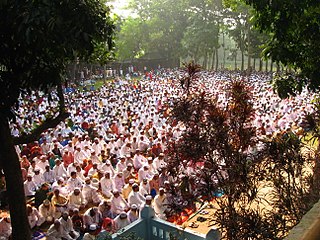
Eid al-Fitr is the earlier of the two official holidays celebrated within Islam. Eid al-Fitr is celebrated by Muslims worldwide because it marks the end of the month-long dawn-to-sunset fasting of Ramadan. Eid al-Fitr falls on the first day of Shawwal in the Islamic calendar; this does not always fall on the same Gregorian day, as the start of any lunar Hijri month varies based on when the new moon is sighted by local religious authorities. The holiday is known under various other names in different languages and countries around the world. The day is also called "Lesser Eid", or simply Eid.

Eid al-Adha or the Feast of Sacrifice is the second of the two main holidays celebrated in Islam. In Islamic custom, it honours the willingness of Abraham to sacrifice his son, Ishmael, or Isaac, as an act of obedience to God's command. However, before Abraham could sacrifice his son in the name of God, and because of his willingness to do so, God provided him with a lamb to sacrifice in his son's place. In commemoration of this intervention, animals such as lambs are sacrificed. The meat of the sacrificed animal is divided into three portions: one part of the meat is consumed by the family that offers the animal, one portion is for friends and relatives, while the rest of the meat is distributed to the poor and the needy. Sweets and gifts are given, and extended family members typically visit and are welcomed. The day is also sometimes called the "Greater Eid".
Bangladesh has numerous public holidays, including national memorial, religious and secular holidays of Bengali origin. The Bengali traditional calendar, known as Baṅgābda is the national and official calendar in Bangladesh. The holidays are celebrated according to Bengali, Islamic or Gregorian calendars for religious and civil purposes, respectively. Religious festivals like Eid are celebrated according to the Islamic calendar whereas other national holidays are celebrated according to the Bengali and Gregorian calendar. While the Islamic calendar is based on the movement of the moon, it loses synchronization with the seasons, through seasonal drift. Therefore, some public holidays are subject to change every year based on the lunar calendar.

Shawwal is the tenth month of the lunar based Islamic calendar. Shawwāl stems from the verb shāla (شَالَ) which means to 'lift or carry', generally to take or move things from one place to another, so named because a female camel normally would be carrying a fetus at this time of year.

There are two official holidays in Islam that are celebrated by Muslims worldwide: Eid al-Fitr and Eid al-Adha. The timing of both holidays are set by the lunar Islamic calendar, which is based upon the cycle of the moon, and so is different from the more common, European, solar-based Gregorian calendar. Every year, the Gregorian dates of the Islamic holidays change.

Eid Mubarak is an Arabic term that means “Blessed feast/festival'”. The term is used by Muslims all over the world. Internationally Muslims use it as a greeting on the feast. In the social sense, people usually celebrate Eid al-Fitr after Ramadan and Eid al-Adha in the month of Dhul Hijjah .This exchange of greetings is a cultural tradition and not part of any religious obligation.

Eid prayers, also referred to as Salat al-Eid, are holy holiday prayers in the Islamic tradition. The literal translation of the word "Eid" in Arabic is "festival" or "feast" and is a time when Muslims congregate with family and the larger Muslim community to celebrate.

The Day of Arafah is an Islamic holiday that falls on the 9th day of Dhu al-Hijjah of the lunar Islamic Calendar. It is the second day of the Hajj pilgrimage and is followed by the holiday of Eid al-Adha. At dawn of this day, Muslim pilgrims will make their way from Mina to a nearby hillside and plain called Mount Arafat and the Plain of Arafat. It was from this site that the Islamic prophet Muhammad gave one of his last sermons in the final year of his life. Some Muslims hold that part of the Quranic verse announcing that the religion of Islam had been perfected was revealed on this day.
Lists of holidays by various categorizations.

Public Holidays in Turkmenistan are laid out in the Constitution of Turkmenistan, which acts as a list of nationally recognized public holidays in the country.
The following is a list of public holidays in Oman.
The following public holidays are the same every year:
This is a list of holidays in South Sudan.
This is a list of holidays in Maldives.
The public holidays of Palestine have varied throughout history.








